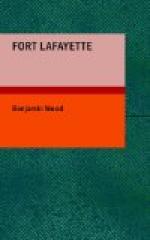“Nay, mother, they were not unkind to me in the fort, and did what they could to make me comfortable. But, Harold, it is wrong. I have thought of it in the long, weary nights in prison, and I have thought of it when I knew that death was beckoning me to come and rest from the thoughts of earth. It is wrong to tamper with the sacred law that shields the citizen. I believe that many a man within those fortress walls is as innocent in the eyes of God as those who sent him there. Yet I accuse none of willful wrong, but only of unconscious error. If the sacrifice of my poor life could shed one ray upon the darkness, I would rejoice to be the victim that I am, of a violated right. But all, statesmen, and chieftains, and humble citizens, are being swept along upon the whirlwinds of passion; all hearts are ablaze with the fiery magnificence of war, and none will take warning till the land shall be desolate, and thousands, stricken in their prime, shall be sleeping—where I shall soon be—beneath the cold sod. I am weary, mother, and chill. Let us go in.”
They bore him in and helped him to his bed, where he lay pale and silent, seeming much worse from the fatigue of conversation and the excitement of his meeting with his old college friend. Mrs. Wayne left him in charge of Harold, while she went below to prepare what little nourishment he could take, and to provide refreshment for her guest.
Arthur lay, for a space, with his eyes closed, and apparently in sleep. But he looked up, at last, and stretched out his hand to Harold, who pressed the thin fingers, whiter than the coverlet on which they rested.
“Is mother there?”
“No, Arthur,” replied Harold. “Shall I call her?”
“No. I thought to have spoken to you, to-morrow, of something that has been often my theme of thought; but I know not what strange feeling has crept upon me; and perhaps, Harold—for we know not what the morrow may bring—perhaps I had better speak now.”
“It hurts you, Arthur; you are too weak. Indeed, you must sleep now, and to-morrow we shall talk.”
“No; now, Harold. It will not hurt me, or if it does, it matters little now. Harold, I would fain that no shadow of unkindness should linger between us twain when I am gone.”
“Why should there, Arthur? You have been my true friend always, and as such shall I remember you.”
“Yet have I wronged you; yet have I caused you much grief and bitterness, and only your own generous nature preserved us from estrangement. Harold, have you heard from her?”
“I have seen her, Arthur. During my captivity, she was my jailer; in my sickness, for I was slightly wounded, she was my nurse. I will tell you all about it to-morrow.”
“Yes, to-morrow,” replied Arthur, breathing heavily. “To-morrow! the word sounds meaningless to me, like something whose significance has left me. Is she well, Harold?”




